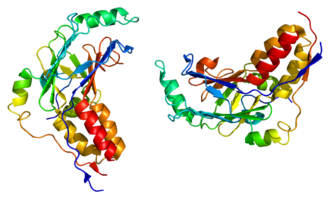Mothers against decapentaplegic

Mothers against decapentaplegic (MAD) is a family of proteins that are part of the Transforming Growth Factor-beta (TGF-β) signaling pathway. These proteins play a crucial role in cellular processes such as proliferation, differentiation, and apoptosis. The name "Mothers against decapentaplegic" is derived from its initial discovery in Drosophila, where mutations in the gene led to embryonic defects resembling those seen in decapentaplegic (dpp) mutants. The MAD proteins are highly conserved across species, indicating their vital role in cellular function and development.
Function[edit]
MAD proteins function as intracellular transducers in the TGF-β signaling pathway. Upon TGF-β ligand binding to its receptor, the receptor phosphorylates receptor-regulated SMADs (R-SMADs), which then form a complex with the co-SMAD, SMAD4. MAD proteins are involved in this pathway as they can act as R-SMADs or as inhibitory SMADs (I-SMADs), regulating the signal transduction either positively or negatively. This complex then translocates to the nucleus, where it regulates the transcription of target genes involved in various cellular processes.
Classification[edit]
MAD proteins can be classified into three main types based on their function within the TGF-β pathway:
- R-SMADs: These are receptor-regulated SMADs that are directly phosphorylated by the TGF-β receptor. They include SMAD1, SMAD2, SMAD3, SMAD5, and SMAD8.
- Co-SMAD: SMAD4 is the common mediator SMAD that forms complexes with phosphorylated R-SMADs to translocate to the nucleus.
- I-SMADs: These are inhibitory SMADs, including SMAD6 and SMAD7, that negatively regulate the pathway by preventing the phosphorylation of R-SMADs or by promoting the degradation of receptor complexes.
Role in Disease[edit]
Alterations in the TGF-β signaling pathway, including mutations in MAD proteins, have been implicated in various diseases. Overactivation of the pathway can lead to fibrosis in organs such as the liver, kidney, and lung. Conversely, reduced activity of the pathway is often observed in cancer, where loss of function mutations in MAD proteins, especially SMAD4, can lead to tumor progression and metastasis. Furthermore, mutations in MAD proteins have been associated with developmental disorders and cardiovascular diseases.
Research and Therapeutic Implications[edit]
Given their central role in critical cellular processes and disease, MAD proteins are a focus of research for therapeutic interventions. Strategies to modulate the TGF-β/MAD signaling pathway include the development of small molecule inhibitors, antibodies, and ligand traps. These therapeutic approaches aim to restore normal signaling in diseases characterized by pathway dysregulation, such as cancer and fibrosis.
See Also[edit]
Ad. Transform your life with W8MD's Budget GLP-1 injections from $49.99


W8MD offers a medical weight loss program to lose weight in Philadelphia. Our physician-supervised medical weight loss provides:
- Weight loss injections in NYC (generic and brand names):
- Zepbound / Mounjaro, Wegovy / Ozempic, Saxenda
- Most insurances accepted or discounted self-pay rates. We will obtain insurance prior authorizations if needed.
- Generic GLP1 weight loss injections from $49.99 for the starting dose of Semaglutide and $65.00 for Tirzepatide.
- Also offer prescription weight loss medications including Phentermine, Qsymia, Diethylpropion, Contrave etc.
NYC weight loss doctor appointmentsNYC weight loss doctor appointments
Start your NYC weight loss journey today at our NYC medical weight loss and Philadelphia medical weight loss clinics.
- Call 718-946-5500 to lose weight in NYC or for medical weight loss in Philadelphia 215-676-2334.
- Tags:NYC medical weight loss, Philadelphia lose weight Zepbound NYC, Budget GLP1 weight loss injections, Wegovy Philadelphia, Wegovy NYC, Philadelphia medical weight loss, Brookly weight loss and Wegovy NYC
|
WikiMD's Wellness Encyclopedia |
| Let Food Be Thy Medicine Medicine Thy Food - Hippocrates |
Medical Disclaimer: WikiMD is not a substitute for professional medical advice. The information on WikiMD is provided as an information resource only, may be incorrect, outdated or misleading, and is not to be used or relied on for any diagnostic or treatment purposes. Please consult your health care provider before making any healthcare decisions or for guidance about a specific medical condition. WikiMD expressly disclaims responsibility, and shall have no liability, for any damages, loss, injury, or liability whatsoever suffered as a result of your reliance on the information contained in this site. By visiting this site you agree to the foregoing terms and conditions, which may from time to time be changed or supplemented by WikiMD. If you do not agree to the foregoing terms and conditions, you should not enter or use this site. See full disclaimer.
Credits:Most images are courtesy of Wikimedia commons, and templates, categories Wikipedia, licensed under CC BY SA or similar.
Translate this page: - East Asian
中文,
日本,
한국어,
South Asian
हिन्दी,
தமிழ்,
తెలుగు,
Urdu,
ಕನ್ನಡ,
Southeast Asian
Indonesian,
Vietnamese,
Thai,
မြန်မာဘာသာ,
বাংলা
European
español,
Deutsch,
français,
Greek,
português do Brasil,
polski,
română,
русский,
Nederlands,
norsk,
svenska,
suomi,
Italian
Middle Eastern & African
عربى,
Turkish,
Persian,
Hebrew,
Afrikaans,
isiZulu,
Kiswahili,
Other
Bulgarian,
Hungarian,
Czech,
Swedish,
മലയാളം,
मराठी,
ਪੰਜਾਬੀ,
ગુજરાતી,
Portuguese,
Ukrainian